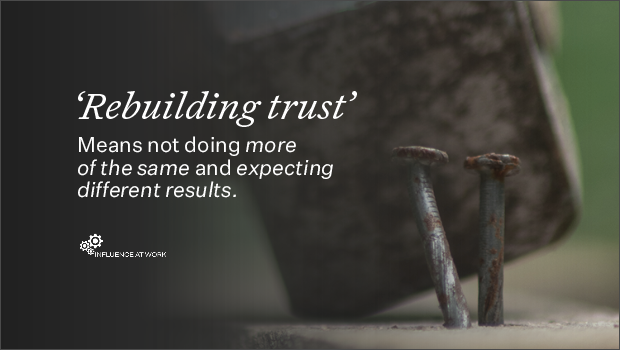
World leaders will shortly descend on Davos to discuss this year’s theme of ‘Rebuilding Trust’. The debate will be shaped by surveys that ask people questions like “Do you trust business?” or “Do you trust the media?” The surveyors’ intent is clear, but the insights they deliver are not. Asking the public to think about trust in abstract and intangible ways is unhelpful and unwise. Trust isn’t abstract. Neither is it intangible. It’s concrete and there are better ways to explore and scrutinise it.
Trust is crucial to any human relationship. It influences how we relate to, and interact, with organisations, governments and each other. Without trust it’s hard to develop successful relationships, create loyal customers and foster prosperous economic exchanges. Trust is also complex and multi-faceted: made up of three core components that vary in importance based on a variety of factors and contexts. That’s why asking general questions about trust provides an oversimplified response. That might be fine if all an organisation or political party wants to know is how they fare on industry and competitor league tables. But if you actually care about trust and want to know not just how trusted you are, but why and what you can do to build and maintain it, then more is needed.
Enhanced approaches to measure trust can offer improved tools and insights, allowing brands to positively influence how much consumers will buy, recommend and advocate them. Doing this requires a focus on three important factors.
Ask people a complex question and they often answer a simpler, different one. Broad questions like “How much do you trust the technology sector?” frequently obscure important nuances. They may result in people thinking about a brand they are most familiar with or that has recently been in the news, biasing scores. To avoid bias it’s more effective to ask behaviourally informed questions that target three core components of trust that behavioural science has identified as mattering most. They are:
This scientifically informed Competence, Integrity, Benevolence (CIB) model allows the creation of a much more helpful set of questions about the behaviours and beliefs mostly likely to lead to trust. The result is a much more concrete and context relevant measure offering actionable strategies for those wishing to build and maintain trust.
MHP Group, working with world-leading behavioural science group INFLUENCE AT WORK and in conjunction with GWI, have designed a way to do exactly this testing it in the UK, US and Germany with 15 high profile brands in the Technology, Financial and Pharmaceutical industries.
Standard trust measures find the technology industry typically fares better than the financial and pharmaceuticals sectors when it comes to who is most trusted. But a closer look through our CIB three-component model tells a different story. Although tech is certainly rated as the most competent, its falls short on integrity and benevolence resulting in the sector falling in the overall rankings from first, to last. It seems that, despite audiences trusting tech companies’ smarts and gizmos, they are much less confident about their values and social impact. Focussing on actions and behaviours that prioritise these components, over competence, is likely to be technology’s most productive approach to restoring trust.
Context matters too. Our research finds that when it comes to perceptions of trust, the relative importance of Competence, Integrity and Benevolence varies from brand to brand. For technology and pharma brands their ‘Benevolence’ score has the biggest influence on business outcomes. For finance, ‘Integrity’ matters a lot too.
Many still believe the route to trust is reliability, transparency and a commitment to good causes. But things are changing. Broader concerns about the impact brands have on people and the extent an industry or organisation can act in honest, ethical ways even if doing so is counter to their interests, increasingly loom large in consumers’ minds.
Our CIB model finds integrity and benevolence have a particularly strong correlation to a range of business outcomes that include increased sales, likelihood to advocate, and a business being seen as a true partner. This holds true across different sectors and the brands within them. Yet, little attention is paid to how to increase these aspects of trust. By measuring the specific behaviours that give rise to increased integrity and benevolence it becomes possible to provide explicit advice on how to boost perceived integrity and benevolence where it is lacking.
The CIB model study supports the long-held belief that higher levels of trust are associated with a range of desirable outcomes for industries and organisations such as improved sales, customers becoming fans. Trust can even protect an organisation and industry’s licence to operate. But the work also clearly demonstrates how trust is much more nuanced than traditional models accommodate. Trust is complex. It is a context dependant human endeavour, rather than an abstract concept and there are ways to build and maintain it more effectively.
If the question keeping leaders up at night is ‘how do we rebuild trust?’, the answer is to start measuring it more accurately before more billions are committed and wasted.